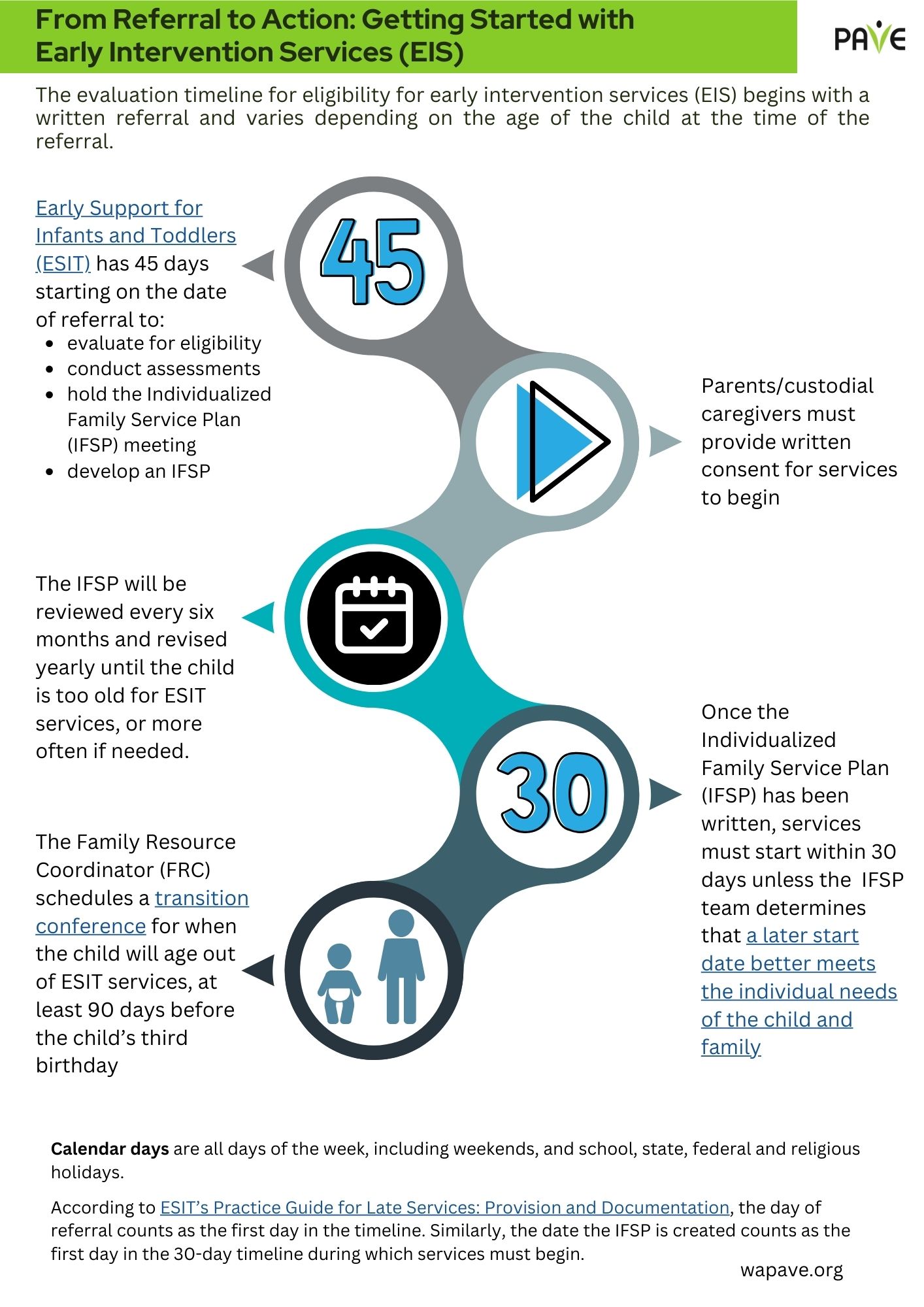
From Birth to Three Toolkit
A Guide to Washington Services for Infants and Toddlers (ages 0-3 with disabilities)
New parents have a lot to manage. Concern about whether a child’s growth and development are on track can be confusing. This toolkit provides places to begin if caregivers suspect that a baby or young child may need services due to a developmental delay or disability.
Presenting our newest resource –From Birth to Three Toolkit. This toolkit encompasses a collection of our informative articles, and serves as a guide to services for infants and toddlers (ages 0-3) with disabilities.
A user – friendly toolkit for families, Each section is detailed below:
- Understanding Developmental Milestones and Delays – Developmental Screening (Birth to Three and Medically Needed Developmental Screening)
- IDEA Part C: Early Intervention Services for Young Children with Disabilities – IDEA: The Foundation of Special Education
- What Happens During an Early Intervention Evaluation?
- Next Steps When Your Child is Found Eligible for Early Intervention Services (EIS)
- From Referral to Action: Getting started with Early Intervention Services (EIS)
- Getting to Know the Individualized Family Service Plan (IFSP)
- Preparing for Productive and Effective Conversations with Education and Service Providers: Our top three tips for effective communication and productive conversations
- What You Need to know About my Child : A one-pager sharing your child’s strengths, challenges, effective strategies, and red flags
- Pathways to Support: Where to Begin : Accessing services through the transition from an IFSP, or beginning with evaluation for an IEP
- What to Expect at the transition Conference Going from Part C to Part B: A guide to help you prepare for the transition planning process
- Who’s Who of the IEP Team: An easy to implement form for identifying members of the IEP team and organizing their contact information
- Differences Between Part B and Part C Services: A cheat sheet to the major differences in eligibility, delivery and maintenance of IFSPs and IEPs
- How and Who to Tell When Your Child is Exceptional: A guide to enrollment in the Exceptional Family Member Program (EFMP) for dependent children of active – duty servicemembers – Found on PAVE’s article Exceptional Family Member Program (EFMP) Part 1: What Makes a Military Family Exceptional?
- Your Child’s Application for Supplemental Security Income (SSI): A step-by-step guide to submitting an application for SSI on behalf of your child
- Your Child’s Application for Developmental Disabilities Administration (DDA): A step-by-step guide to submitting an application for DDA on behalf of your child
- Resources to Help You Be the Best for Your Child: Emotional and respite support programs designed for caregiving family members
- Communication Log : A tool for tracking your conversations with members of the IEP team
- Abbreviation Cheat Sheet and Glossary of Terms
- Frequently Asked Questions
Early Learning Articles:
- Early Intervention: How to Access Services for Children Birth to 3 in Washington
- Section 504: A Plan for Equity, Access and Accommodations
- Military Interstate Children’s Compact Commission (MIC3), Part 3: How the Compact Protects Academic Progress toward Graduation
- Your Child’s Application for Developmental Disabilities (DDA)
- From Birth to Three Toolkit
- Where to Begin When A Student Needs Help
- Starting School: When and How to Enroll a Student in School
- Steps to Read, Understand, and Develop an Initial IEP
- Steps to Read, Develop, and Understand an IEP Worksheet
- What Happens During an Early Intervention Evaluation?
- Getting to Know the Individualized Family Service Plan (IFSP)
- Next Steps When Your Child is Found Eligible for Early Intervention Services (EIS)
- IEP Tips: Evaluation, Present Levels, SMART goals
- Special Education Frequently Asked Questions
- Special Education Terms
- Who’s Who on the IEP Team
- Communication Log
- Educational Program Options for Children Aged 3-5 Years Old
- Preparing for Productive and Effective Conversations with Education and Service Providers
- Common Accommodations and Modifications in an IEP For 3-5 year old’s






















